外研版九年级下册Module 4 Unit 3 Language in use Grammar课件(共17张PPT)
文档属性
| 名称 | 外研版九年级下册Module 4 Unit 3 Language in use Grammar课件(共17张PPT) | 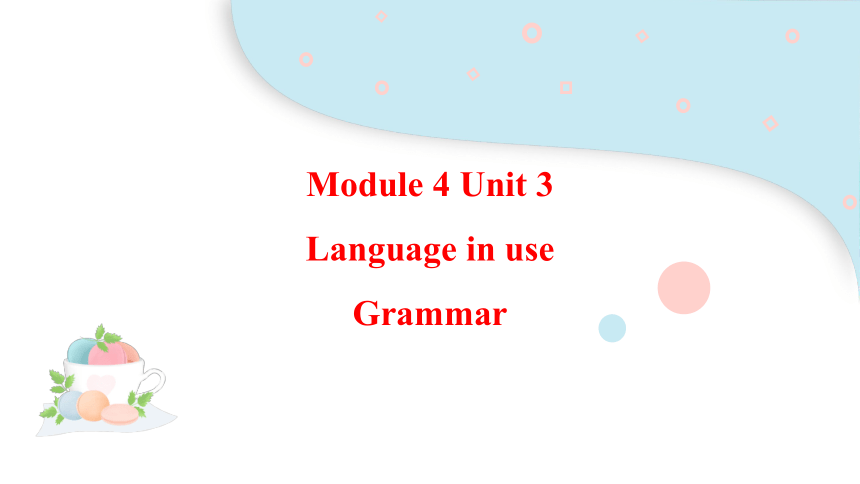 | |
| 格式 | pptx | ||
| 文件大小 | 3.7MB | ||
| 资源类型 | 教案 | ||
| 版本资源 | 外研版 | ||
| 科目 | 英语 | ||
| 更新时间 | 2025-04-27 20:22:03 | ||
图片预览

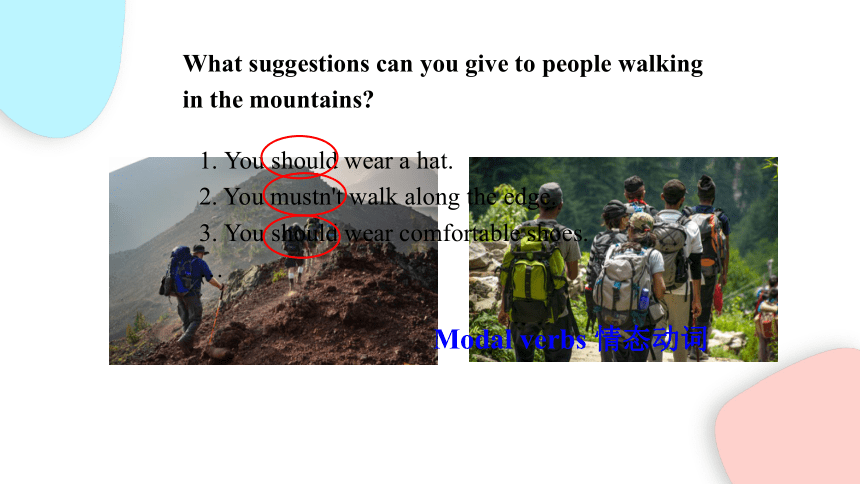
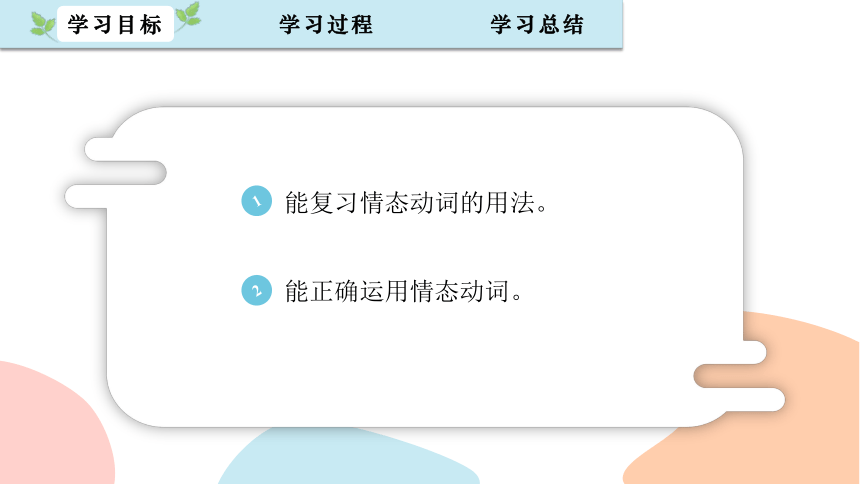
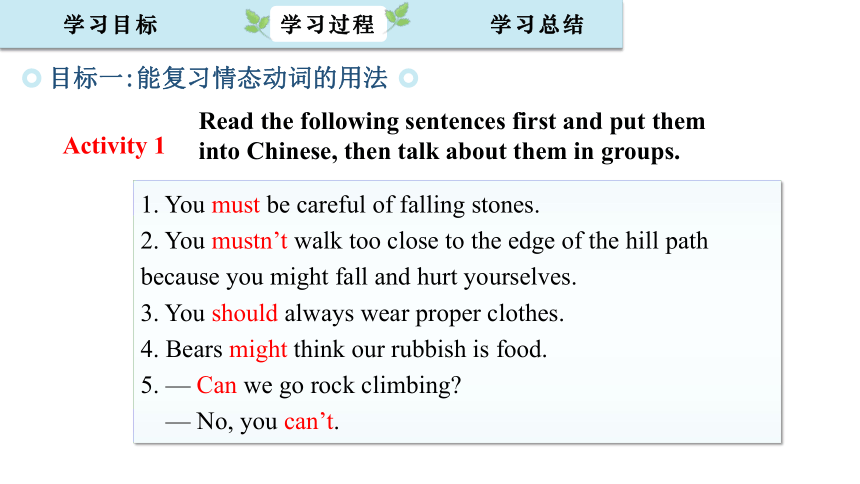
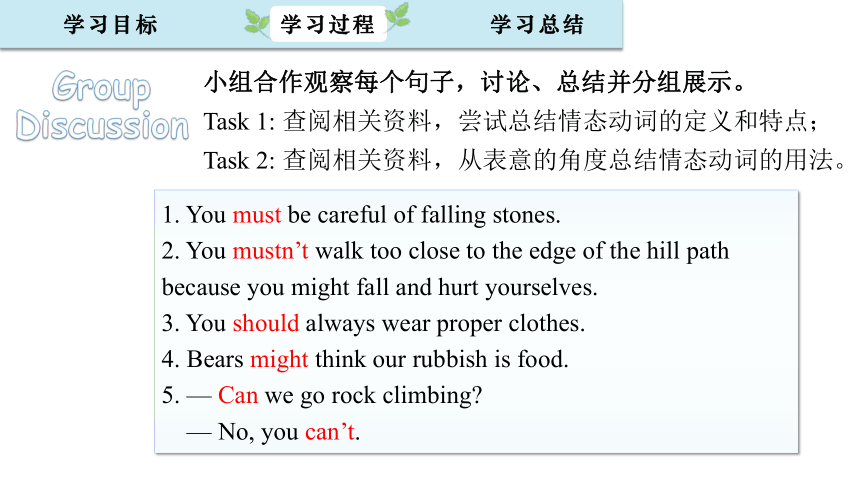
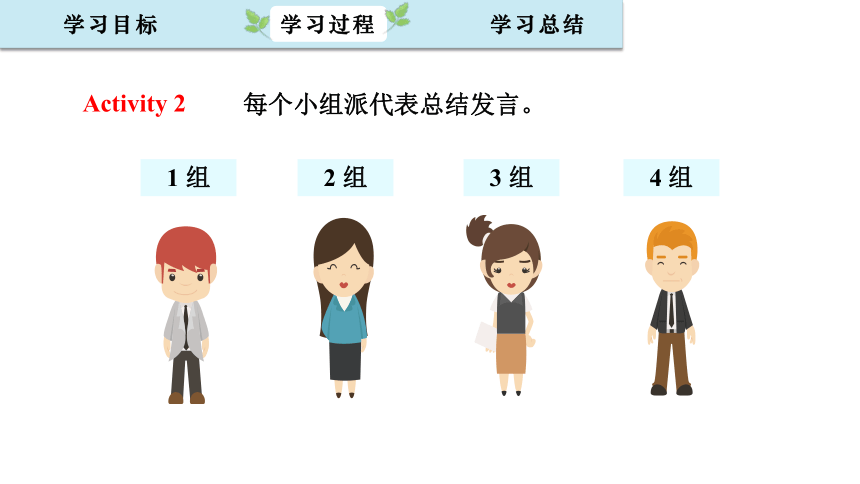
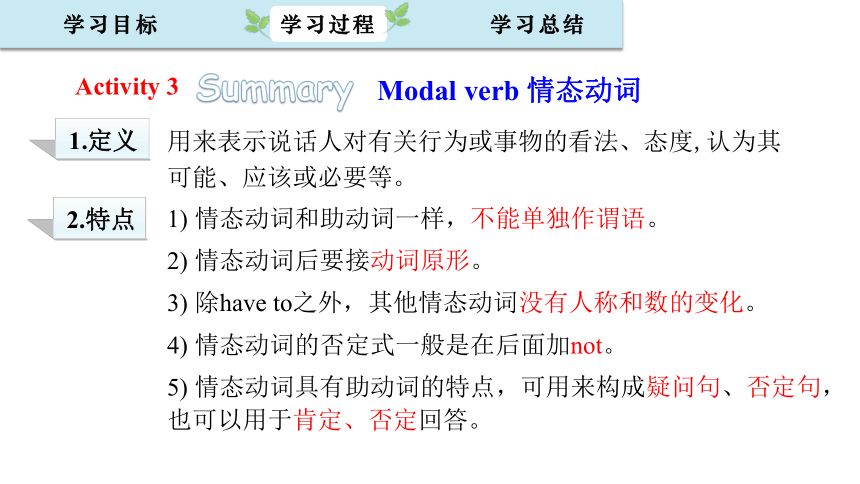
文档简介
(共17张PPT)
Module 4 Unit 3
Language in use
Grammar
What suggestions can you give to people walking in the mountains
1. You should wear a hat.
2. You mustn't walk along the edge.
3. You should wear comfortable shoes.
…
Modal verbs 情态动词
1
2
能复习情态动词的用法。
能正确运用情态动词。
目标一:能复习情态动词的用法
Activity 1
Read the following sentences first and put them
into Chinese, then talk about them in groups.
1. You must be careful of falling stones.
2. You mustn’t walk too close to the edge of the hill path because you might fall and hurt yourselves.
3. You should always wear proper clothes.
4. Bears might think our rubbish is food.
5. — Can we go rock climbing
— No, you can’t.
Group
Discussion
小组合作观察每个句子,讨论、总结并分组展示。
Task 1: 查阅相关资料,尝试总结情态动词的定义和特点;
Task 2: 查阅相关资料,从表意的角度总结情态动词的用法。
1. You must be careful of falling stones.
2. You mustn’t walk too close to the edge of the hill path because you might fall and hurt yourselves.
3. You should always wear proper clothes.
4. Bears might think our rubbish is food.
5. — Can we go rock climbing
— No, you can’t.
Activity 2
每个小组派代表总结发言。
1 组
2 组
3 组
4 组
Activity 3
Summary
Modal verb 情态动词
1.定义
用来表示说话人对有关行为或事物的看法、态度,认为其
可能、应该或必要等。
2.特点
1) 情态动词和助动词一样,不能单独作谓语。
2) 情态动词后要接动词原形。
3) 除have to之外,其他情态动词没有人称和数的变化。
4) 情态动词的否定式一般是在后面加not。
5) 情态动词具有助动词的特点,可用来构成疑问句、否定句,也可以用于肯定、否定回答。
3.用法
1. 表示能力
表示一个人能做某事时,常用can或could表达。例如:
As soon as Mike could read, he read books about robots.
迈克刚能看懂书,就看关于机器人的书。
My five-year-old daughter can draw a beautiful picture in five minutes.
我五岁的女儿能在五分钟之内画出一幅漂亮的图画。
2.表示可能性
如果要表达“可能,可能性”, 可以用may / might 或 can / could。例如:
Jane may be at home. 简可能在家。
I might talk to him. 我可能会跟他说说。
You can go to Beijing by train. 你可以坐火车去北京。
3.表示许可或征求对方许可
如果表达允许某人做某事, 或征求对方的许可, 可以用can / could / may / might。例如:
You can / may start your work now. 你现在可以开始工作了。
Could / May I come a little later tomorrow I don’t feel myself.
我明天可以晚到一会吗 我觉得不太舒服。
4.表示请求对方做某事
如果要请求对方做某事,可以用下列表达方式:
Will / Would / Could you (please) … / Would you mind …
例如:Would you please help me with this suitcase
你可以帮我拿这个手提箱吗?
Would you mind turning down the music 你能把声音关小点儿声吗?
6.表示意愿
表示想做某事可以用would like / love to … 例如:
I’d like to be a scientist. 我想成为科学家。
7.表示应该、义务
表示应该、义务等时常用should, ought to, must。例如:
You should talk to your parents. 你应该跟你父母谈谈。
I ought to train more to improve my skill. 我应该多训练来提高技巧。
5.表示建议和邀请
表建议和邀请可用下列表达方式:
Would you like (to) … / Shall we … 例如:
Would you like to play basketball 你想打篮球吗?
Shall we go 我们走吧?
8.表示命令、禁止、不得不
表示这类含义时,一般用must, mustn't, have to等。例如:
You must study maths to be an engineer. 要当工程师,你必须学数学。
You mustn't tell it to anyone. 你不许把这件事告诉任何人。
You have to come early tomorrow. 你明天得早到。
9.表示没必要做某事
表示没必要做某事时,常用needn't, don't have to等。例如:
You don't have to worry about money. I can lend you some in time of need.
你不用担心钱,你需要的时候我可以借给你。
I needn't remind you of that terrible tie you bought yesterday.
我不必提醒你昨天买的那条糟糕透了的领带。
目标二:能正确运用情态动词
Activity 1
1
Match the signs with the rules and warnings.
1. No smoking.
2. No eating or drinking.
3. Children crossing.
4. Danger! Be careful of falling rocks.
5. Children should be taken care of by parents.
6. Do not drink and drive.
c
b
d
e
f
a
Use modal verbs to talk about rules and suggestions.
Activity 2
2
Read the list of rules and write sentences using must, mustn’t, should or shouldn’t.
1. You must check in at the main gate when you come to the centre.
2. You should climb with someone.
3. You must wear a hard hat at all times.
4. You must wear the correct climbing shoes.
5. You must wear comfortable clothes.
6. You mustn’t climb without a rope.
7. You mustn’t eat or drink anywhere except in the restaurant.
8. You shouldn’t listen to personal music players while climbing.
9. You shouldn’t talk on a mobile phone while climbing.
Answers:
3
Work in pairs. Explain why the rules above are important.
—Why must you check in when you come to the centre
—Because they want to know who is there.
1. Why must you climb with someone
2. Why must you wear comfortable clothes
3. Why mustn’t you climb without a rope
4. Why shouldn’t you listen to music while climbing
综合上述目标,说说我们今天的收获。
学习目标
1
2
能复习情态动词的用法。
能正确运用情态动词。
Module 4 Unit 3
Language in use
Grammar
What suggestions can you give to people walking in the mountains
1. You should wear a hat.
2. You mustn't walk along the edge.
3. You should wear comfortable shoes.
…
Modal verbs 情态动词
1
2
能复习情态动词的用法。
能正确运用情态动词。
目标一:能复习情态动词的用法
Activity 1
Read the following sentences first and put them
into Chinese, then talk about them in groups.
1. You must be careful of falling stones.
2. You mustn’t walk too close to the edge of the hill path because you might fall and hurt yourselves.
3. You should always wear proper clothes.
4. Bears might think our rubbish is food.
5. — Can we go rock climbing
— No, you can’t.
Group
Discussion
小组合作观察每个句子,讨论、总结并分组展示。
Task 1: 查阅相关资料,尝试总结情态动词的定义和特点;
Task 2: 查阅相关资料,从表意的角度总结情态动词的用法。
1. You must be careful of falling stones.
2. You mustn’t walk too close to the edge of the hill path because you might fall and hurt yourselves.
3. You should always wear proper clothes.
4. Bears might think our rubbish is food.
5. — Can we go rock climbing
— No, you can’t.
Activity 2
每个小组派代表总结发言。
1 组
2 组
3 组
4 组
Activity 3
Summary
Modal verb 情态动词
1.定义
用来表示说话人对有关行为或事物的看法、态度,认为其
可能、应该或必要等。
2.特点
1) 情态动词和助动词一样,不能单独作谓语。
2) 情态动词后要接动词原形。
3) 除have to之外,其他情态动词没有人称和数的变化。
4) 情态动词的否定式一般是在后面加not。
5) 情态动词具有助动词的特点,可用来构成疑问句、否定句,也可以用于肯定、否定回答。
3.用法
1. 表示能力
表示一个人能做某事时,常用can或could表达。例如:
As soon as Mike could read, he read books about robots.
迈克刚能看懂书,就看关于机器人的书。
My five-year-old daughter can draw a beautiful picture in five minutes.
我五岁的女儿能在五分钟之内画出一幅漂亮的图画。
2.表示可能性
如果要表达“可能,可能性”, 可以用may / might 或 can / could。例如:
Jane may be at home. 简可能在家。
I might talk to him. 我可能会跟他说说。
You can go to Beijing by train. 你可以坐火车去北京。
3.表示许可或征求对方许可
如果表达允许某人做某事, 或征求对方的许可, 可以用can / could / may / might。例如:
You can / may start your work now. 你现在可以开始工作了。
Could / May I come a little later tomorrow I don’t feel myself.
我明天可以晚到一会吗 我觉得不太舒服。
4.表示请求对方做某事
如果要请求对方做某事,可以用下列表达方式:
Will / Would / Could you (please) … / Would you mind …
例如:Would you please help me with this suitcase
你可以帮我拿这个手提箱吗?
Would you mind turning down the music 你能把声音关小点儿声吗?
6.表示意愿
表示想做某事可以用would like / love to … 例如:
I’d like to be a scientist. 我想成为科学家。
7.表示应该、义务
表示应该、义务等时常用should, ought to, must。例如:
You should talk to your parents. 你应该跟你父母谈谈。
I ought to train more to improve my skill. 我应该多训练来提高技巧。
5.表示建议和邀请
表建议和邀请可用下列表达方式:
Would you like (to) … / Shall we … 例如:
Would you like to play basketball 你想打篮球吗?
Shall we go 我们走吧?
8.表示命令、禁止、不得不
表示这类含义时,一般用must, mustn't, have to等。例如:
You must study maths to be an engineer. 要当工程师,你必须学数学。
You mustn't tell it to anyone. 你不许把这件事告诉任何人。
You have to come early tomorrow. 你明天得早到。
9.表示没必要做某事
表示没必要做某事时,常用needn't, don't have to等。例如:
You don't have to worry about money. I can lend you some in time of need.
你不用担心钱,你需要的时候我可以借给你。
I needn't remind you of that terrible tie you bought yesterday.
我不必提醒你昨天买的那条糟糕透了的领带。
目标二:能正确运用情态动词
Activity 1
1
Match the signs with the rules and warnings.
1. No smoking.
2. No eating or drinking.
3. Children crossing.
4. Danger! Be careful of falling rocks.
5. Children should be taken care of by parents.
6. Do not drink and drive.
c
b
d
e
f
a
Use modal verbs to talk about rules and suggestions.
Activity 2
2
Read the list of rules and write sentences using must, mustn’t, should or shouldn’t.
1. You must check in at the main gate when you come to the centre.
2. You should climb with someone.
3. You must wear a hard hat at all times.
4. You must wear the correct climbing shoes.
5. You must wear comfortable clothes.
6. You mustn’t climb without a rope.
7. You mustn’t eat or drink anywhere except in the restaurant.
8. You shouldn’t listen to personal music players while climbing.
9. You shouldn’t talk on a mobile phone while climbing.
Answers:
3
Work in pairs. Explain why the rules above are important.
—Why must you check in when you come to the centre
—Because they want to know who is there.
1. Why must you climb with someone
2. Why must you wear comfortable clothes
3. Why mustn’t you climb without a rope
4. Why shouldn’t you listen to music while climbing
综合上述目标,说说我们今天的收获。
学习目标
1
2
能复习情态动词的用法。
能正确运用情态动词。
同课章节目录
- Module 1 Travel
- Unit 1 We toured the city by bus and by taxi
- Unit 2 It's a long story.
- Unit 3 Language in use
- Module 2 Education
- Unit 1 They don't sit in rows.
- Unit 2 What do I like best about school?
- Unit 3 Language in use
- Module 3 Life now and then
- Unit 1 They sometimes work harder.
- Unit 2 I think life is better today.
- Unit 3 Language in use.
- Module 4 Rules and suggestions
- Unit 1 You must be careful of falling stones.
- Unit 2 we must keep the camp clean.
- Unit 3 Language in use.
- Revison A
- Module 5 Look after yourself
- Unit 1 We'd better get you to hospital.
- Unit 2 Get off the sofa!
- Unit 3 Language in use.
- Module 6 Eating togethe
- Unit 1 When is the school-leavers' party?
- Unit 2 Knives and forks are used for most Western
- Unit 3 Language in use
- Module 7 English for you and me
- Unit 1 Have you ever been to an English corner?
- Unit 2 We all own English.
- Unit 3 Language in use
- Module 8 My future life
- Unit 1 Here's to our friendship and the future
- Unit 2 I know that you will be better at maths.
- Unit 3 Language in use
- Revison B
